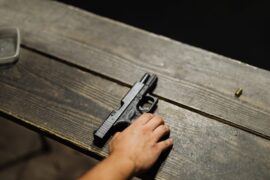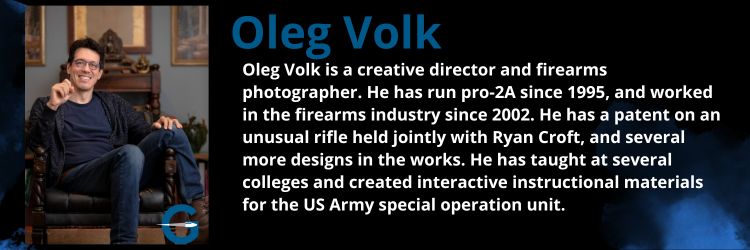
Careers Beyond Gunsmithing in the Firearms Industry
Gunsmithing education offers transferable skills onto the learner. In addition to a working gunsmith knowledge, graduates have other career options, due to transferable skills. These skills include:
- Firearms repair and maintenance: You will learn how to repair and maintain various types of firearms, including pistols, rifles, shotguns, and revolvers. Jobs could include basic repair and maintenance, to full restoration and reconstruction of firearms.
- Customization and modification: You can learn how to customize and modify firearms according to the specific needs and preferences of customers, such as trigger jobs, installing sights, custom grips, and engraving. Typically, this goes hand-in-hand with repair and general maintenance.
- Manufacturing: You may learn how to manufacture firearms, including designing, building, and testing custom firearms. You may be exposed to specific types of machining, which can translate to most other manufacturing fields. Most usually, firearm and ammunition makers house manufacturing and packaging under one roof. This also includes metalworking; cutting, drilling, milling, and welding to create or modify gun parts based on specified orders.
- Woodworking: You may learn how to work with wood to make or repair gun stocks, grips, and other wooden components.
- Ballistics and accuracy testing: You may learn how to test and improve the accuracy of firearms, including measuring bullet velocity and trajectory.
- Customer service: You will learn how to communicate effectively with customers, provide them with information, and answer any questions they may have.
While specific job titles in the firearms industry require subsequent skill sets, overall, gunsmith education requires a combination of both technical and creative skills, as well as attention to detail and a commitment to safety. If you aren’t interested in gunsmithing, it’s okay—you still have an in with the firearms industry.
Firearm Photography
For example, my friend Teruhiko Yano came all the way from Japan to study gunsmithing in America. Ultimately, he became of America’s preeminent photographers and writers specializing in firearms. His articles in Japanese Gun Professionals always show a keen understanding of the internal details and function of firearms modern or classic.
Machining
Machining skills translate almost perfectly into most other manufacturing fields. It is no accident that a number of firearms and ammunition makers, Maker Bullet being one, house medical device manufacturing under the same roof.
Specifically, CNC machining, or Computer Numerical Control machining, is a manufacturing process that uses computer software to control the movement of cutting tools to shape and cut raw materials into finished parts or products for assembly. Typically, this process starts with a digital design, which is then translated into a series of instructions that the CNC machine uses to cut into a desired shape. While this manufacturing is used in a wide range of industries, it is especially important to the firearms industry, as crating high-precision parts allows a high level of accuracy, consistency, and duplication.
Customer Service
Since part of the gunsmith’s brief is working with customers to understand their needs and wants fully and accurately, customer service and related jobs are obvious alternate paths as well. A smith capable of drawing out the customer’s ideas about particularly oddball modifications to a firearm and translating the wishes into realistic project specifications can figure out communications concerning other technologies and products as well.
Some key skills that are essential for customer service roles includes communication, empathy, patience, and problem-solving. While gunsmithing education may not offer the best foundation for interpersonal skills, it does establish the knowledge base needed to converse with customers.
Armorer
An armorer is a skilled craftsperson who designs, creates, repairs, and maintains various types of armor and weapon. Typically, armorers work with institutions, such as in the public sector, or in film and television, museums, and reenactment groups.
Institutional armorers at police departments are often non-officer contractors. An armorer can also be a gunsmith, or can just supply organization and maintenance without doing upgrades or repairs. A person possessing both skill sets would obviously be more popular with employers.
Research and Development
Gunsmithing background and skill set are also necessary prerequisites for research and development position at a firearms maker. A certain gun designer’s first attempt at a rifle was with 303 British cartridge and home-made receiver, bolt, and barrel. Since he was unaware of heat-treating, the entire construction grenaded at the first test firing. A classic gunsmith education would have saved him both effort and risk.
Research and development requires the conducting of scientific research and testing to ensure the safety and effectiveness of firearms and related products; any course in the firearm industry will relay the importance of safety and how to review and quantify these measures. Research also branches into regulatory and compliance, as you are required to comply with federal and state laws and other regulations to keep active licensure.
Sales and Marketing
Retail sales at stores and wholesale at distributors don’t necessarily require gunsmithing background, but it makes a person more effective at communication. Understanding firearms on that deeper level would also enable one to act as a purchasing agent, able to tell a good product from bad by design or manufacturing quality. Sales representatives require skills in excellent customer service, demonstrating firearms to potential buyers, and processing sales transactions. Communication and interpersonal skills are a plus as well!
All in all, as with most industries, your education offers more career prospects than what you are initially studying for. Spend time to review the possible skills you pick up with gunsmithing education, as it may cast a wider net than you initially believe.
Written by: Oleg Volk, Firearms Photographer

